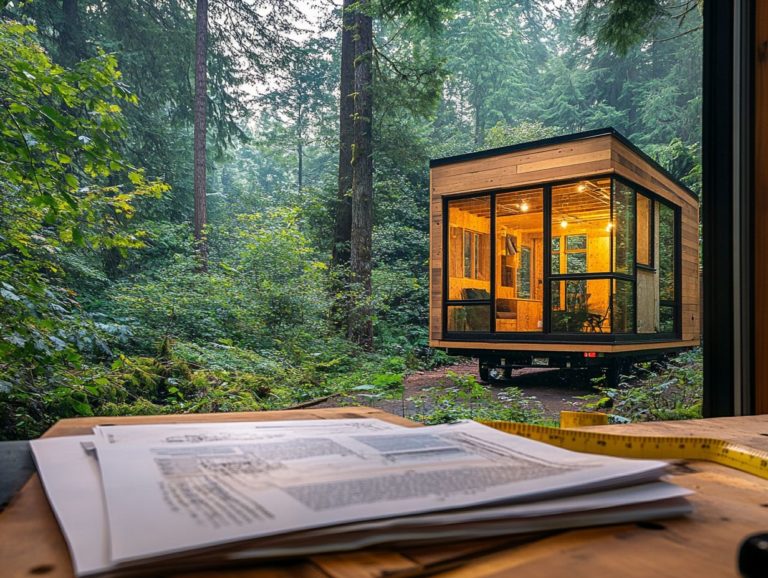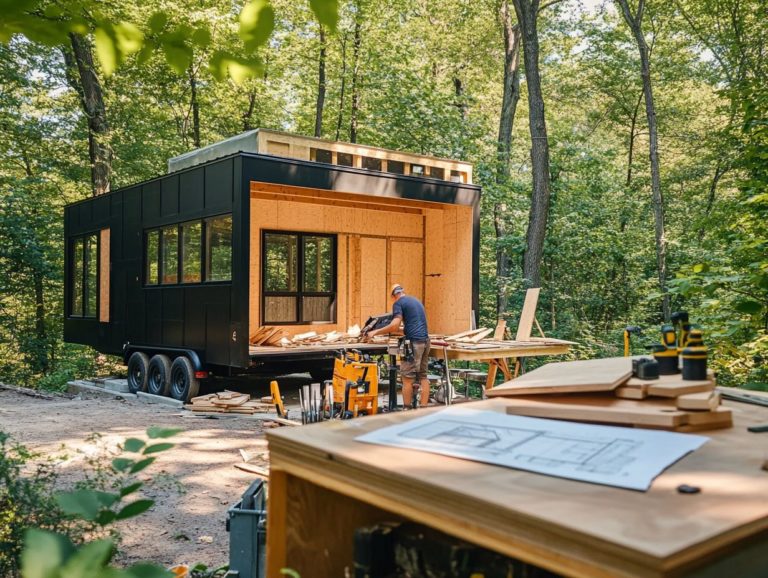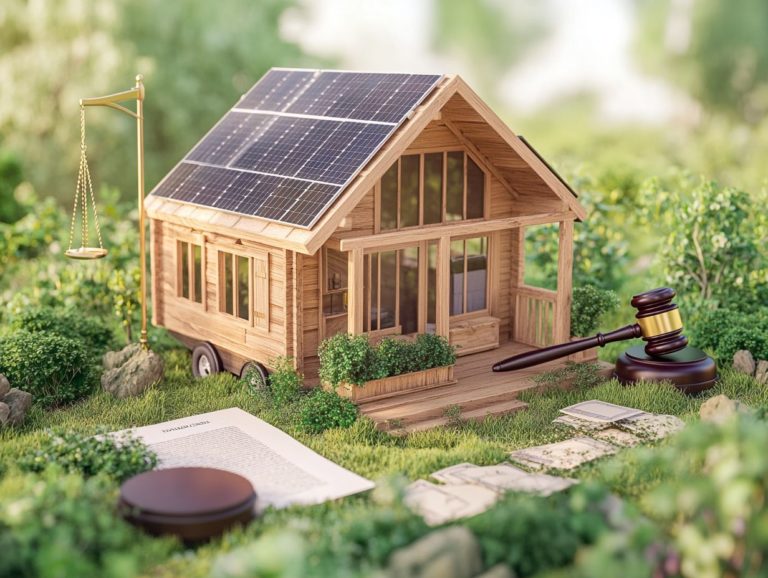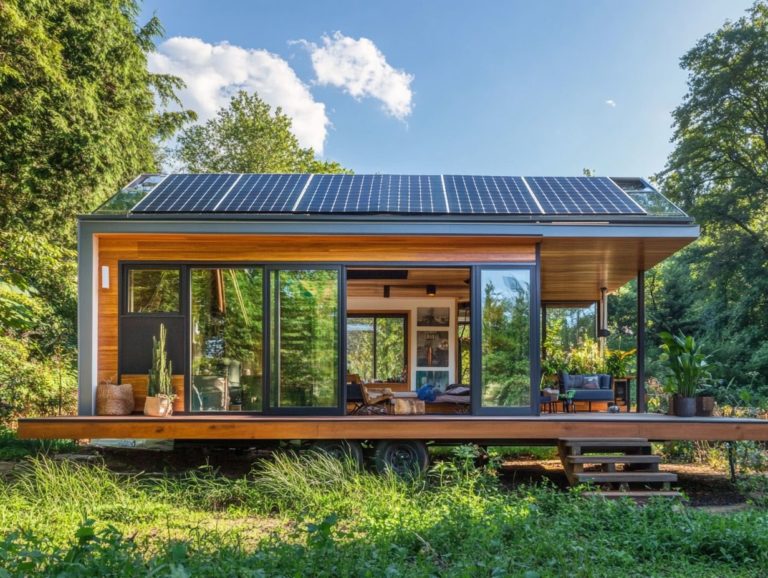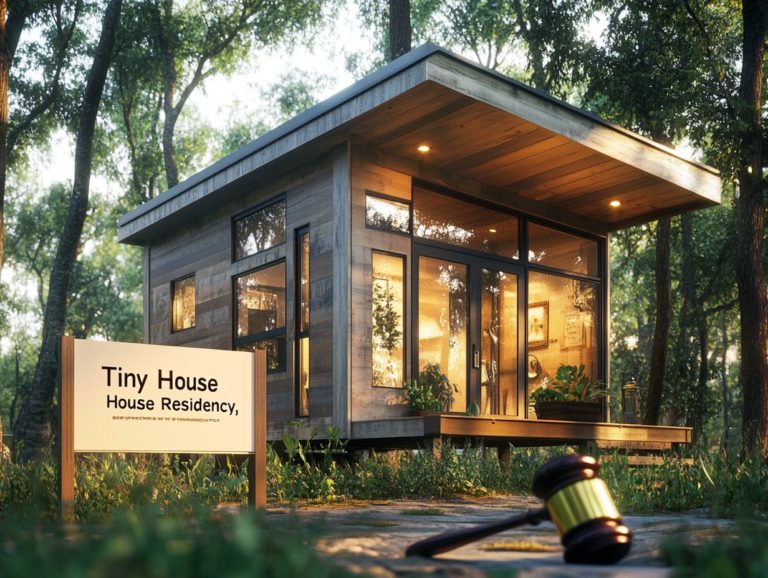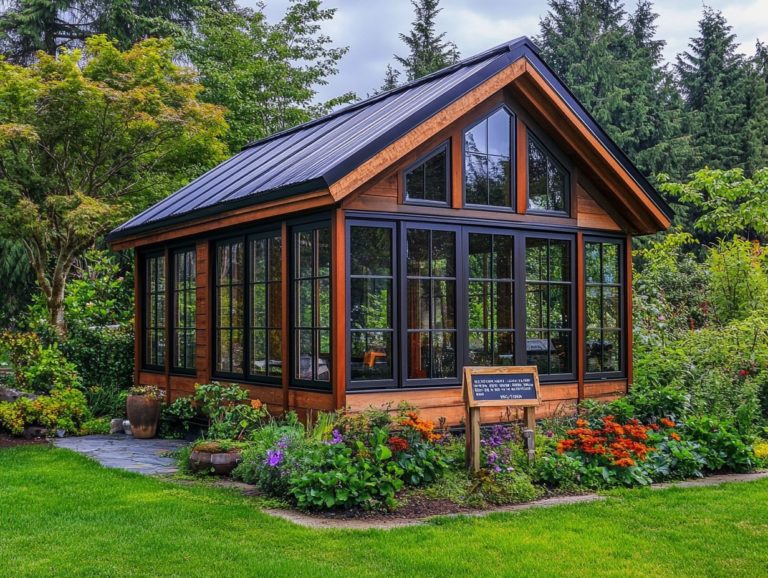Tiny House Legal Resources You Should Know
Tiny house living is capturing imaginations everywhere, presenting a lifestyle defined by simplicity, sustainability, and the allure of financial freedom.
Before you embark on this downsized adventure, understanding the legal landscape is essential. This article gives you a clear overview of tiny houses, exploring their definition, advantages, and the legal intricacies you need to navigate.
From rules about where you can build homes to invaluable resources, this guide will light up your path don t miss out on the tiny house revolution!
Whether you’re a curious explorer or a committed downsizer, this guide will illuminate your journey into the rewarding world of tiny house living.
Contents [hide]
- Key Takeaways:
- Overview of Tiny House Living
- Legal Considerations for Tiny House Living
- Resources for Understanding Tiny House Laws
- Navigating Legal Challenges
- Alternative Living Options
- Frequently Asked Questions
- What legal resources should tiny house owners be aware of?
- Do I need to obtain permits for my tiny house?
- Can I park my tiny house on any piece of land?
- Are there any legal requirements for the size of a tiny house?
- Are there any legal resources for finding communities of tiny house owners?
- Can I legally live in a tiny house full-time?
Key Takeaways:
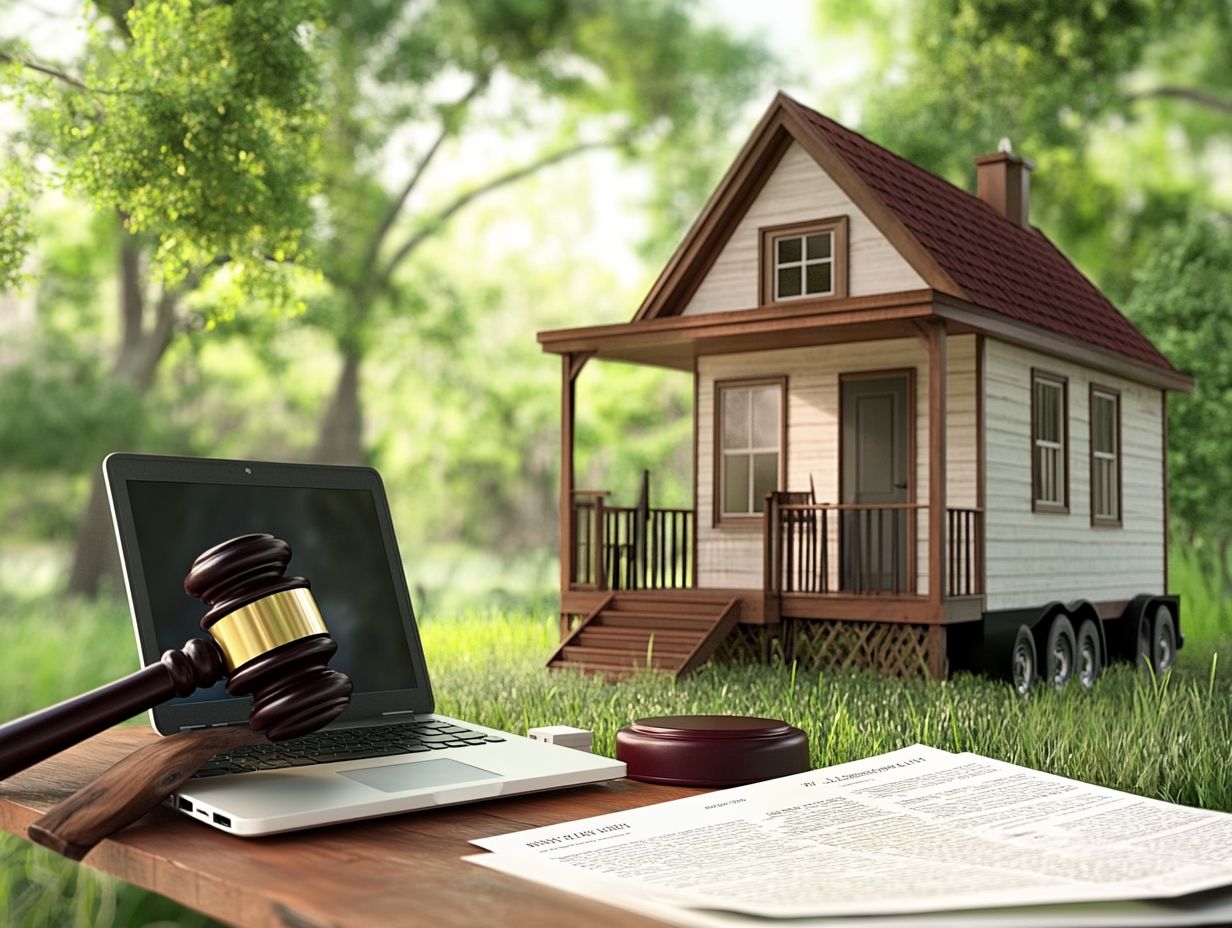
- Know the zoning and building codes in your area to ensure compliance.
- Use government websites and legal experts for guidance on tiny house laws.
- Explore various small living options to find what suits you best.
Overview of Tiny House Living
Tiny house living has emerged as a vital topic in the conversation about affordable housing, especially in states like California. The tiny house movement is gaining significant traction.
Compact dwellings under 400 square feet present innovative solutions to housing challenges in bustling urban centers like Los Angeles and San Francisco.
Emphasizing minimalism and sustainability, tiny homes are crafted to maximize space and minimize costs. They appeal to a diverse array of individuals and families.
Real estate agents are increasingly recognizing the value of tiny house communities, which provide distinctive living experiences tailored to modern lifestyles.
What is a Tiny House?
A tiny house is a compact dwelling that typically ranges from 100 to 400 square feet. It is crafted for efficient living and a reduced environmental footprint often using eco-friendly materials.
These petite structures prioritize functionality, featuring clever layouts that make the most of every square inch. You ll find essential living spaces, kitchens, and bathrooms all thoughtfully integrated.
Common design elements include lofted sleeping areas, multi-functional furniture, and large windows that invite in natural light, creating a sense of openness.
Tiny homes can be either mobile, built on a trailer for easy travel, or stationary, resting on a permanent foundation. Building requirements for tiny houses can vary significantly by location, influenced by zoning laws and permits that differ from those for traditional homes.
The smaller footprint often allows them to bypass certain regulations. Understanding these legal distinctions is essential for anyone considering minimalist living.
Benefits of Tiny House Living
Tiny house living presents an array of benefits tailored just for you. Imagine enjoying affordability, a reduced environmental impact, and a simplified lifestyle that champions minimalism while allowing you the freedom to define your space.
This movement serves as a refreshing alternative to traditional housing and nurtures a sense of community among those in tiny house neighborhoods.
With rising costs of living, particularly in urban areas like Fresno and San Diego, many individuals are drawn to this lifestyle. It simplifies utility connections and can even lower your home insurance costs.
But the allure goes beyond mere financial savings. Tiny house enthusiasts often report an uplift in mental well-being as they declutter their lives, prioritizing experiences over material possessions.
In fact, surveys reveal that nearly 68% of tiny homeowners experience greater happiness after making the switch. They savor the newfound time and financial freedom that smaller living spaces provide.
The tiny house movement is pivotal in promoting affordable housing solutions. It encourages sustainable practices, such as off-grid living, and fosters a minimal ecological footprint.
By constructing a home that resonates with your values, you may find yourself more connected to your community and the environment, paving the way for a more fulfilling and conscious lifestyle.
In conclusion, tiny house living is an exciting opportunity. Embrace this movement and explore how it can transform your life!
Legal Considerations for Tiny House Living
Understanding the legal aspects of tiny house living is crucial for anyone considering this lifestyle. Zoning regulations, building codes, and California’s specific requirements can significantly affect where and how these homes are built.
Each area has its own set of rules regarding the legality of tiny houses. This includes whether they can be placed on private property or within designated tiny house communities. As the tiny house movement continues to flourish, understanding the legal myths around tiny house living is increasingly important to ensure that tiny homes remain a viable option for affordable housing.
Zoning and Building Codes
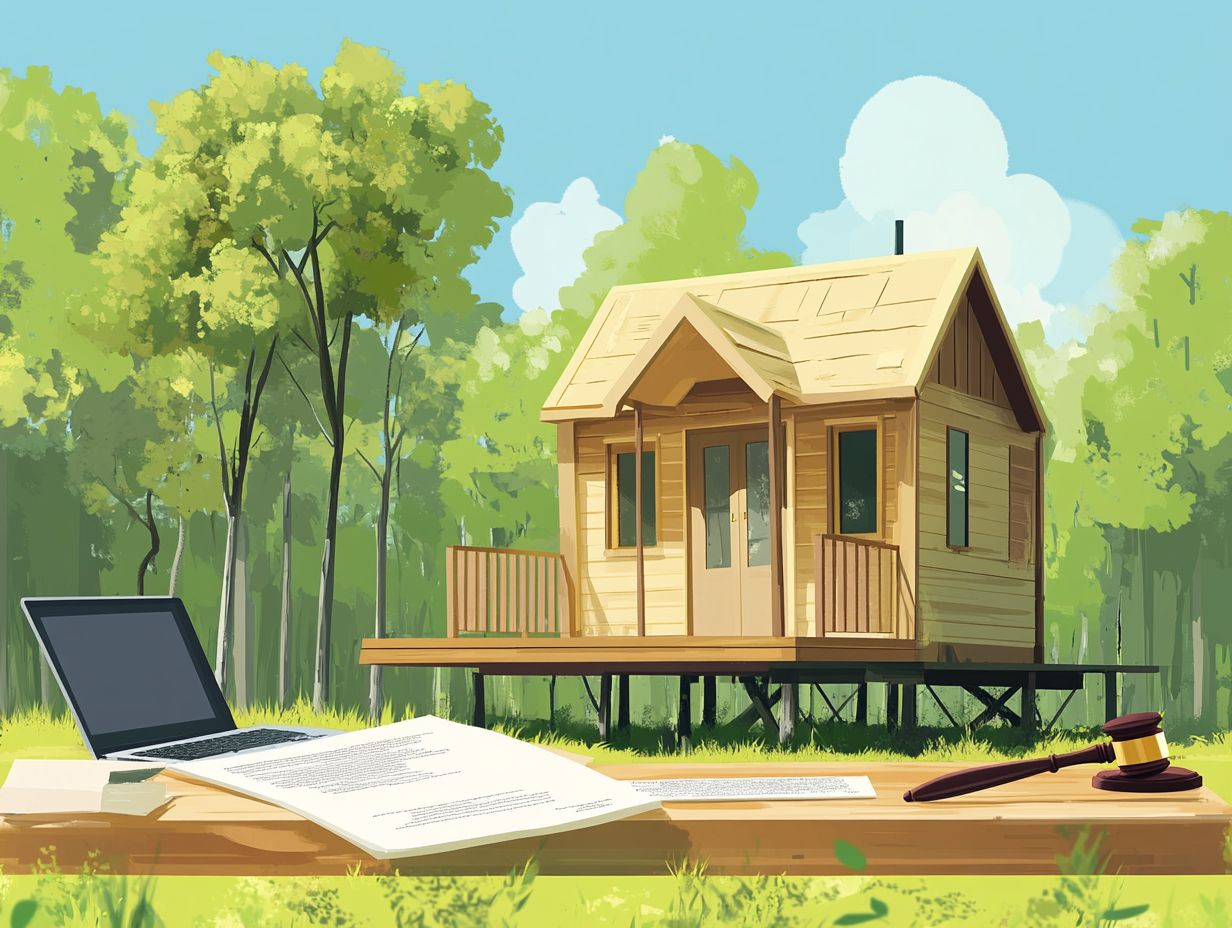
Zoning and building codes are crucial in determining where you can legally construct tiny houses. These regulations can vary significantly from one area to another, especially in California.
This inconsistency can create confusion for you as a potential homeowner looking to downsize or simplify your living arrangements. Recent changes in California’s regulations aim to clarify the distinction between tiny houses and accessory dwelling units (ADUs), which are small homes built on the same lot as a main house. For more detailed information on this topic, refer to tiny house licensing, which offers you greater flexibility if you’re interested in sustainable living.
Local governments are recognizing the potential of tiny house communities as affordable housing solutions. However, understanding the legal rules can be tricky, but it’s worth it!
By staying informed about local ordinances, you can gain a clearer understanding of your options and the implications of these evolving regulations.
Permits and Regulations
To legally establish a tiny home, you must secure the necessary building permits and comply with local regulations regarding utility connections and other essential services.
Navigating this process can often feel overwhelming, especially since regulations vary significantly based on your location. It’s crucial to understand tiny house land use laws, as they dictate where tiny homes can be situated and what types of structures are permissible.
You may frequently encounter challenges such as restrictive ordinances, parking regulations, and building codes that are not designed with smaller dwellings in mind. Compliance with utility requirements can add another layer of complexity. For more information, check out tiny house licensing, as you might need creative solutions for waste disposal, water supply, and energy usage.
Being familiar with the tiny house options that align with these specific laws empowers you to choose designs that match your area’s standards, especially by understanding tiny house zoning laws.
Resources for Understanding Tiny House Laws
Navigating tiny house laws can feel overwhelming, yet a wealth of resources is at your fingertips. Government websites, the American Tiny House Association, and legal professionals who specialize in tiny house matters offer invaluable insights for prospective owners like yourself.
With the right guidance, you can confidently maneuver through the complexities and make informed decisions.
Government Websites and Organizations
Government websites and esteemed organizations like the American Tiny House Association and Tiny Home Industry Association provide invaluable resources for anyone interested in tiny home regulations and community guidelines.
These entities act as essential platforms where you can uncover detailed information about zoning laws, building codes, and specific community requirements pertaining to tiny houses. By shedding light on the legal landscape, they empower you to make informed choices about your living arrangements while ensuring compliance with local regulations. For a deeper understanding, check out tiny house living: the importance of zoning.
Accessing these resources enhances your understanding and fosters a sense of community among tiny house enthusiasts. It allows you to network and exchange best practices. With guidance from these governmental resources and industry organizations, you gain clarity on your rights alongside valuable insights into the responsibilities that accompany this unique lifestyle, including the tiny house movement and legal challenges.
Legal Professionals Specializing in Tiny Houses
Consulting legal professionals who specialize in tiny house laws can be very helpful. They help untangle the complexities of legal tiny homes and ensure you re compliant with local regulations.
By tapping into their extensive knowledge of local rules about land use and building codes, these experts can guide you around potential pitfalls. They provide tailored advice that aligns with your municipality’s specific requirements, streamlining the process and alleviating stress.
Organizations like the American Legal Service Publishing Corporation serve as excellent resources for obtaining relevant legal insights and support when facing disputes or inquiries. Engaging these professionals also saves you time and gives you the peace of mind that comes from knowing your tiny home project is legally sound, especially when you consider tiny house regulations.
Navigating Legal Challenges
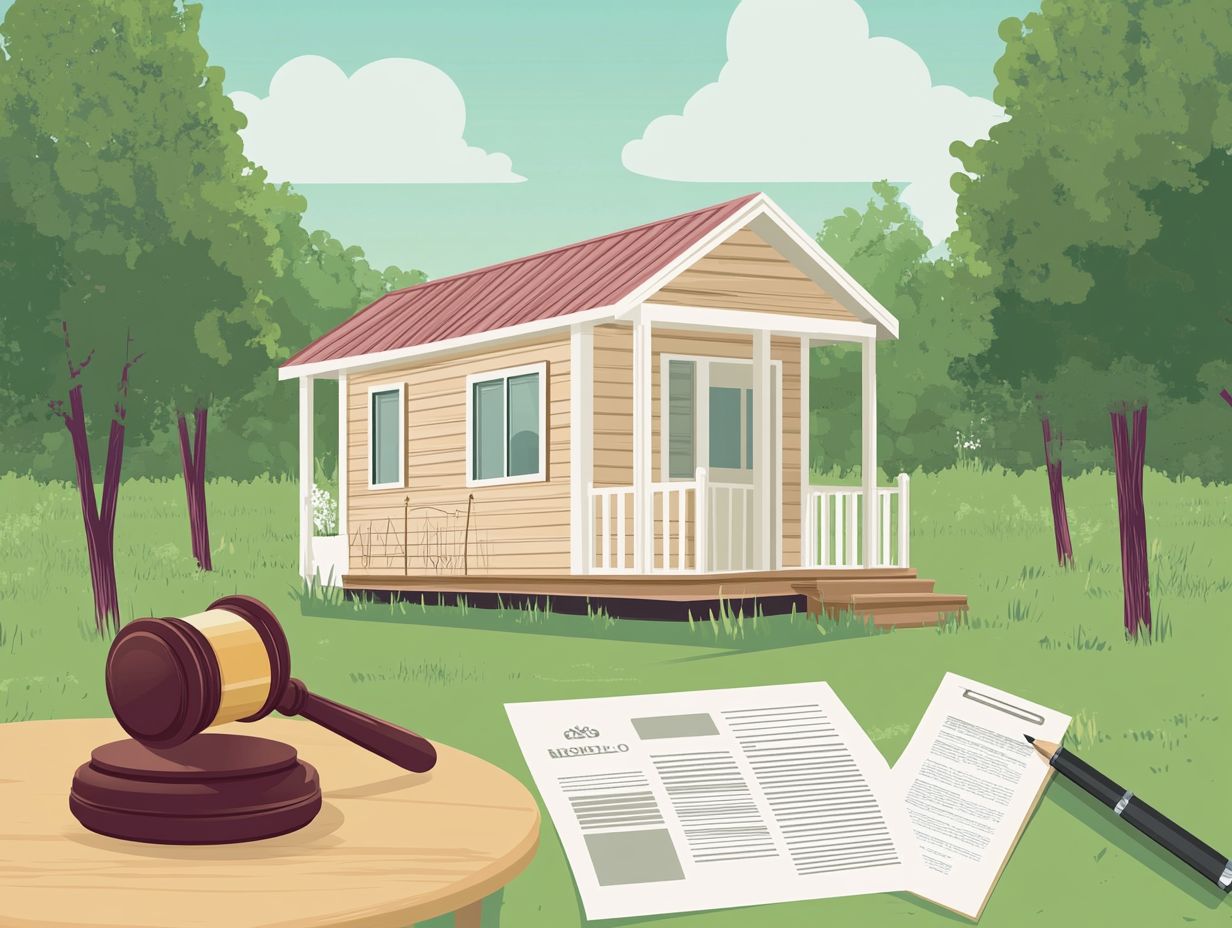
Navigating the legal landscape of tiny house living presents a range of challenges, particularly when grasping the common legal issues associated with tiny homes. You’ll need to ensure compliance with building requirements, which can differ significantly from one jurisdiction to another.
Knowing these details is key to enjoying your tiny home without legal hiccups.
Common Legal Issues and How to Address Them
Tiny house owners face several legal hurdles, such as zoning rules, building permits, and legal classifications. These issues can feel overwhelming, but you can tackle them head-on.
Zoning regulations can differ dramatically from one municipality to another. In some areas, tiny homes might be explicitly prohibited, while others may impose specific requirements regarding size, height, or even mobility. It’s important to understand the legal status of tiny houses in your location.
Don t wait! Start researching your local zoning laws today to avoid future complications. Securing the necessary building permits is crucial and may involve submitting plans that clearly demonstrate adherence to safety and structural codes.
Engaging with tiny house communities and legal experts can offer invaluable insights into successfully tackling these issues.
Alternative Living Options
For individuals considering alternative living options, tiny homes are one of several innovative solutions. They present distinct advantages that resonate with the rising trends of minimalism and sustainability in today s housing market.
Other Small Living Options to Consider
Besides tiny homes, you might explore other small living options like modular homes, RV living, and co-housing. Each presents its own unique advantages and lifestyle choices.
Modular homes offer flexibility to customize your space, adapting it to fit your personal needs while often being more budget-friendly than traditional constructions. Built in sections and assembled on-site, they also boast a remarkably quick turnaround time.
If mobility is what you crave, RV living is hard to beat. It provides you with the freedom to travel while accommodating essential living amenities. On the other hand, co-housing nurtures a sense of community, where shared resources and communal spaces promote social interaction and help lower living costs.
When weighing these alternatives against tiny homes, consider factors like initial investment, long-term savings, and the flexibility you desire. This thoughtful approach can lead you to a fulfilling and economical living experience.
Frequently Asked Questions
What legal resources should tiny house owners be aware of?
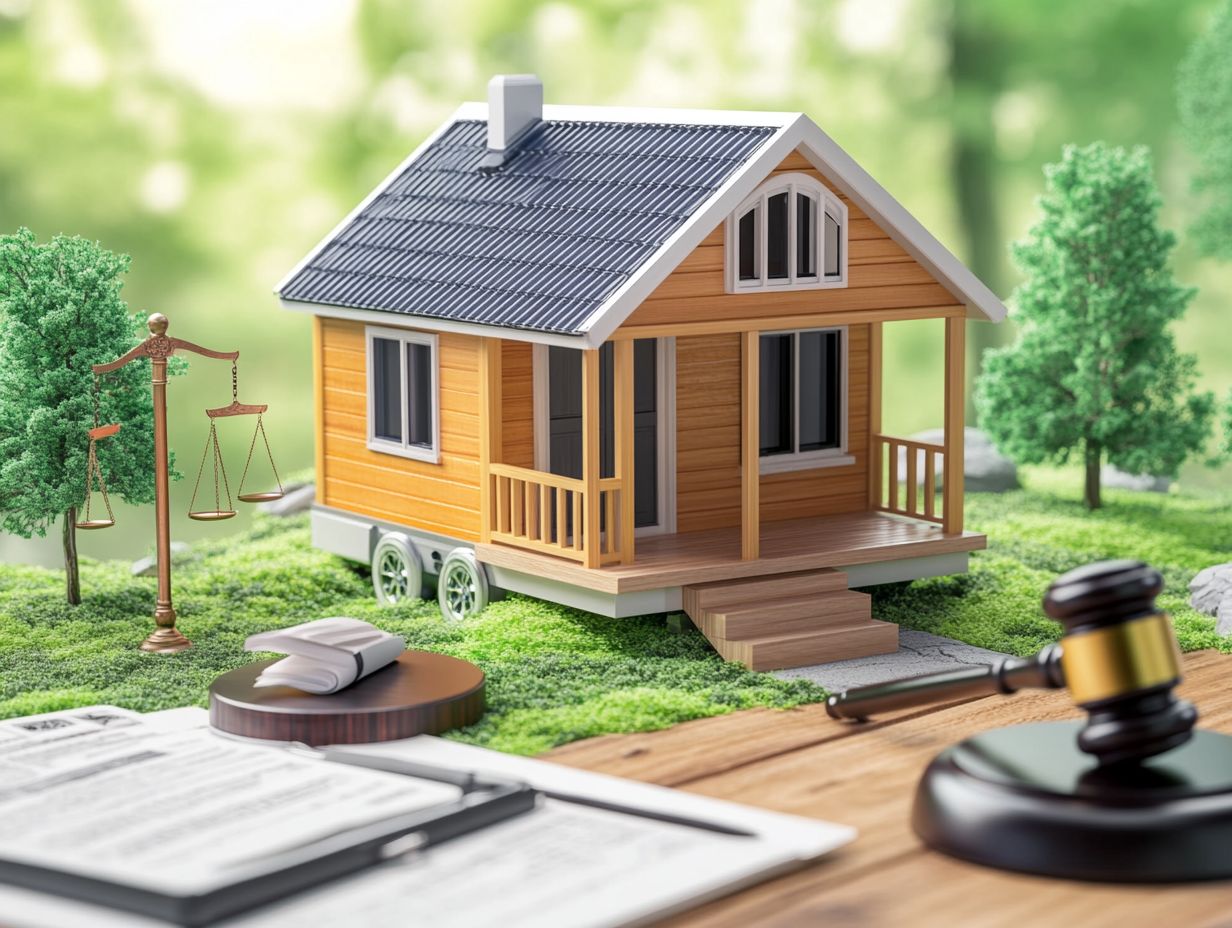
Some important legal resources for tiny house owners include zoning and building codes, state and local laws, and regulations for utilities and insurance.
Do I need to obtain permits for my tiny house?
Whether you need permits depends on where you live and how big your tiny house is. Researching local regulations before construction is essential!
Can I park my tiny house on any piece of land?
No, you can’t just park it anywhere. You must check zoning rules to find out where you can legally place your tiny house.
Are there any legal requirements for the size of a tiny house?
Local building codes and zoning laws may limit the size of your tiny house. Make sure to understand these rules before you start building!
Are there any legal resources for finding communities of tiny house owners?
Absolutely! Join online forums and communities dedicated to tiny house living. You’ll find plenty of information and support from fellow tiny house enthusiasts!
Can I legally live in a tiny house full-time?
Living full-time in a tiny house can be legal or illegal depending on where you are. Check local laws to make an informed decision!

